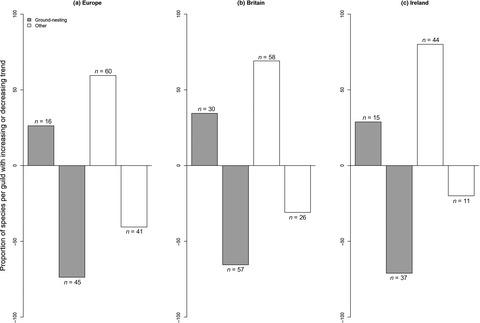当前位置:
X-MOL 学术
›
J. Appl. Ecol.
›
论文详情
Our official English website, www.x-mol.net, welcomes your feedback! (Note: you will need to create a separate account there.)
European bird declines: Do we need to rethink approaches to the management of abundant generalist predators?
Journal of Applied Ecology ( IF 5.7 ) Pub Date : 2020-07-20 , DOI: 10.1111/1365-2664.13695 Barry J. McMahon 1 , Susan Doyle 1 , Aimée Gray 1 , Seán B. A. Kelly 1 , Steve M. Redpath 2
中文翻译:

欧洲鸟类的衰落:我们是否需要重新思考管理大量通缉大鳄的方法?
更新日期:2020-07-20
Journal of Applied Ecology ( IF 5.7 ) Pub Date : 2020-07-20 , DOI: 10.1111/1365-2664.13695 Barry J. McMahon 1 , Susan Doyle 1 , Aimée Gray 1 , Seán B. A. Kelly 1 , Steve M. Redpath 2
Affiliation

|
- Bird species are declining across Europe. Current European policy, that is, the Birds and Habitats Directives, focus on habitat management as a way of halting the declines. This paper explores the role of predation in causing bird population declines and asks if we need to reconsider our approach to the management of generalist predators.
- We analysed bird population trends and distribution changes across Europe, Britain and Ireland, reflecting an increasing gradient of generalist predator abundance (principally red fox Vulpes vulpes and species of the family Corvidae). We tested if ground‐nesting bird species, considered more vulnerable to predation, were in greater decline compared to other nesting strategies. We also compared Annex I designated species to non‐designated species as a proxy for habitat management.
- We found that across Europe, 74% of ground‐nesting bird species were in decline, compared to 41% of other species. This was especially evident in Britain, where the pattern was 66% compared to 31%, and in Ireland, 71% compared to 20%. Ground‐nesting species were significantly more likely to be declining than other species.
- These patterns are consistent with the idea that population declines are at least partially related to the increased abundance of generalist predators. In Britain, ground‐nesting species were less likely to be in decline if covered by Annex I designation. However, in Europe and Ireland, Annex I status did not mitigate the effect of nesting strategy.
- Policy implications. Current legislation is clearly insufficient to prevent widespread declines in ground‐nesting birds, and this is the case across Europe, in Britain and Ireland. Ignoring the role of generalist predators in modern landscapes may lead to further declines and losses. We urgently need large‐scale experiments to establish causality in the impact of generalist predators on ground‐nesting birds in different landscapes. If we value our ground‐nesting bird species, consideration needs to be given to the control of widespread generalist predators, at least until landscapes are restored.
中文翻译:

欧洲鸟类的衰落:我们是否需要重新思考管理大量通缉大鳄的方法?
- 全欧洲鸟类种类正在减少。当前的欧洲政策(即鸟类和栖息地指令)将栖息地管理作为遏制衰退的一种方式。本文探讨了捕食在导致鸟类数量下降中的作用,并询问我们是否需要重新考虑对通才捕食者进行管理的方法。
- 我们分析了禽流人口趋势和整个欧洲,英国和爱尔兰分布的变化,反映了通才捕食丰度的增加梯度(主要是赤狐赤狐和家庭的种类鸦科)。我们测试了被认为更容易被捕食的地面筑巢鸟类与其他筑巢策略相比,其下降幅度是否更大。我们还将附件一指定物种与非指定物种进行了比较,以作为栖息地管理的代理。
- 我们发现,在整个欧洲,有74%的地面嵌套鸟类在减少,而其他物种则为41%。这在英国尤为明显,英国的比例为66%,而31%;爱尔兰为71%,而20%。地面筑巢物种比其他物种下降的可能性更大。
- 这些模式与人口减少至少部分与通才捕食者数量的增加有关的想法是一致的。在英国,如果附则I的名称涵盖了地面嵌套物种,则其下降的可能性较小。但是,在欧洲和爱尔兰,附件一的地位并没有减轻嵌套策略的影响。
- 政策含义。当前的立法显然不足以防止地面鸟类的大量减少,欧洲,英国和爱尔兰就是这种情况。忽略通才掠食者在现代景观中的作用可能会导致进一步的衰退和损失。我们迫切需要进行大规模的实验,以建立通才捕食者对不同地貌的地面鸟类的影响的因果关系。如果我们珍视地面栖息的鸟类,则至少在恢复景观之前,必须考虑控制广泛的捕食者。


























 京公网安备 11010802027423号
京公网安备 11010802027423号